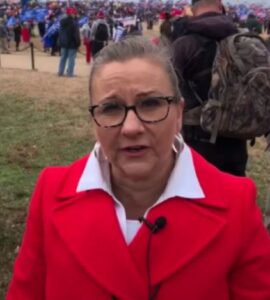
by James A. Bacon
Democrats coined a highly effective phrase, “voter suppression,” to describe Republican efforts to regulate the integrity of the voting process. Maybe it’s time Republicans popularized the phrase, “candidate suppression.”
Sen. Amanda Chase, R-Chesterfield, is a case in point. As the Republican Party of Virginia nears its nominating convention for statewide offices, Facebook appears to have permanently removed her official state Senate page, reports Virginia Business.
Let me be clear: I am not a Chase fan. But the fact that her rhetoric and behavior is objectionable to many (including me) does not cancel her right to run for office and express her views. Chase leads in polls of Republican Party candidates for governor. It is is not remotely acceptable that Facebook has shut down one of her most important means of communicating with voters.
Chase still has a personal Facebook page and supporters of her gubernatorial campaign maintain a private Facebook group, but she claims to have had 144,000 followers on the Facebook page that was shut down. Virginia Business describes her Facebook tribulations in detail.
Chase campaign worker John Findlay, a former executive director of the Republican Party of Virginia, attempted last week to get Chase’s Facebook page reinstated before the convention. The social media giant first restricted Chase from streaming live video, posting or commenting on the page for 30 days in early January, and it took down two videos Chase posted from the National Mall in Washington, D.C., during a pro-Trump rally that took place a few hours before the violent takeover of the Capitol.
On March 11, Findlay, whose wife is also part of Chase’s campaign staff, emailed Facebook employee Rachel Holland, who is responsible for U.S. politics and government outreach. Findlay’s email to Holland was conciliatory, writing that Chase was “more than willing to comply” with Facebook’s requests, including deleting posts and “avoiding forbidden content.” Findlay added that Chase “would like to do a great deal of advertising” on Facebook. He said in an interview Sunday that he considered the request “likely a longshot, but it was a distinct possibility,” noting that Chase and Trump are the only high-profile political figures whose pages have been removed by Facebook.
However, Facebook did not change its mind. Reiterating a Jan. 19 communication with Chase’s campaign, Holland wrote in a March 16 email that Chase’s Senate page “was correctly disabled upon incurring multiple violations of our Community Standards which resulted in content removal. … Due to the potential for real-world harm, we do not allow exceptions [to] this policy.”
Facebook’s de-platforming of Chase follows the suspension of the Virginia Citizens Defense League (VCDL) Facebook account and Mailchimp’s email service in January. VCDL had sponsored peaceful gun rights rallies in Richmond but had no involvement with the Jan. 6, 2021, storming of the Capitol building that prompted a wave of shutdowns and suspensions. (The VCDL Political Action Committee still has a presence on Facebook.)
Let us not forget that the Virginia Senate also voted to censure Chase following her involvement in the rally, even though she had no involvement with the mob scene at the Capitol, and stripped her of committee assignments. And in other General Assembly action, Governor Ralph Northam declined to schedule a snap election after the death of Sen. Ben Chafin in January, effectively disenfranchising the 200,000 voters of his Southwestern Virginia senatorial district for the 2021 session.
Does anybody see a pattern here?
Bacon’s bottom line: When conservative elected officials, candidates and advocacy groups are de-platformed, how do they react? Do they take it lying down like good little right-wingers, shut up, and do what their masters bid them? Or do they retreat into darker recess of the Internet beyond the reach of the censors, gaining freedom of expression but inhabiting bubbles where contradictory views are not heard and conspiratorial thinking flourishes? I’m pretty sure it’s the latter. If the goal is to breed paranoia, extremism and unhinged thinking, chasing conservatives from mainstream media is a very effective way of doing it.

Leave a Reply
You must be logged in to post a comment.